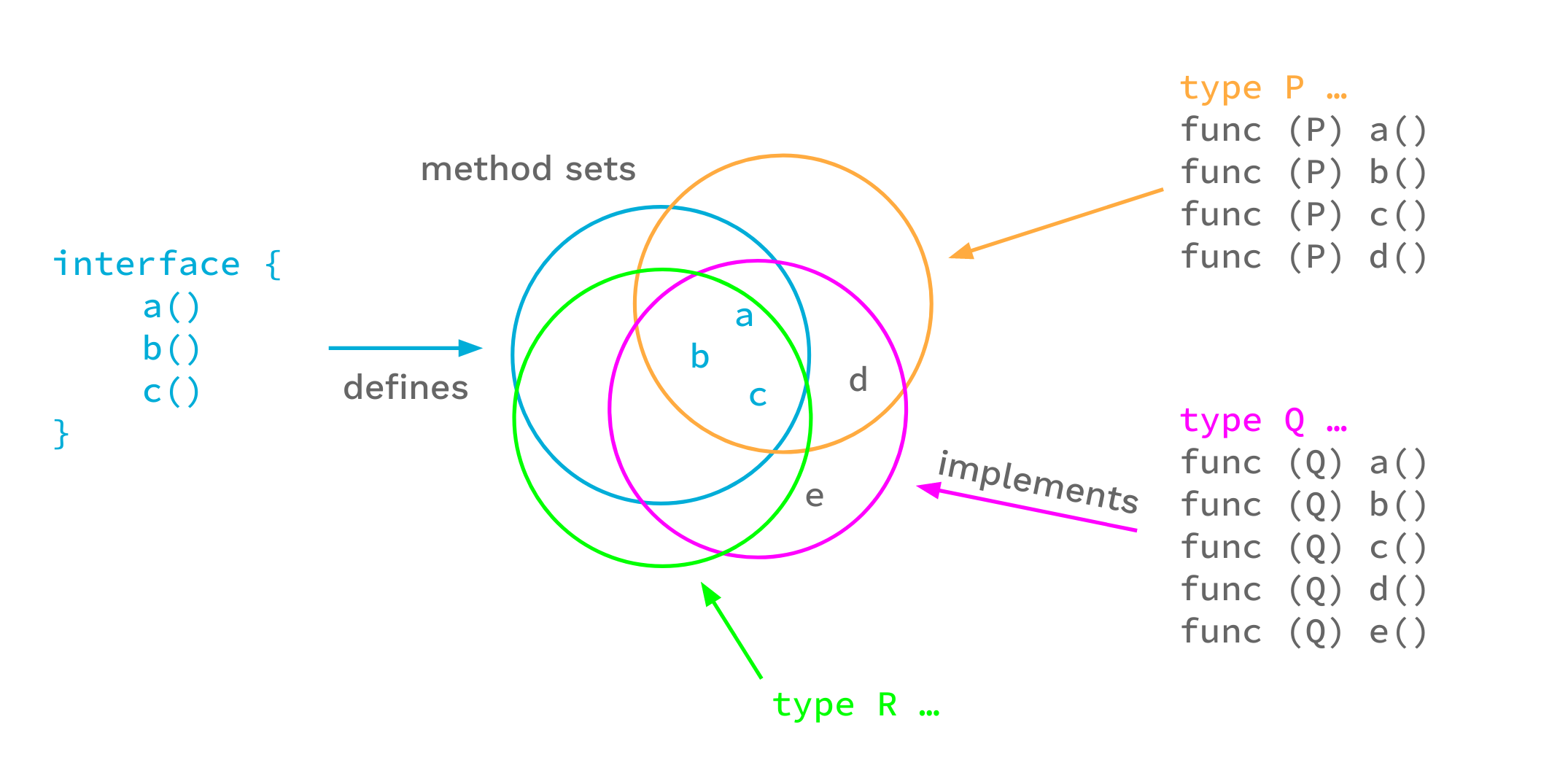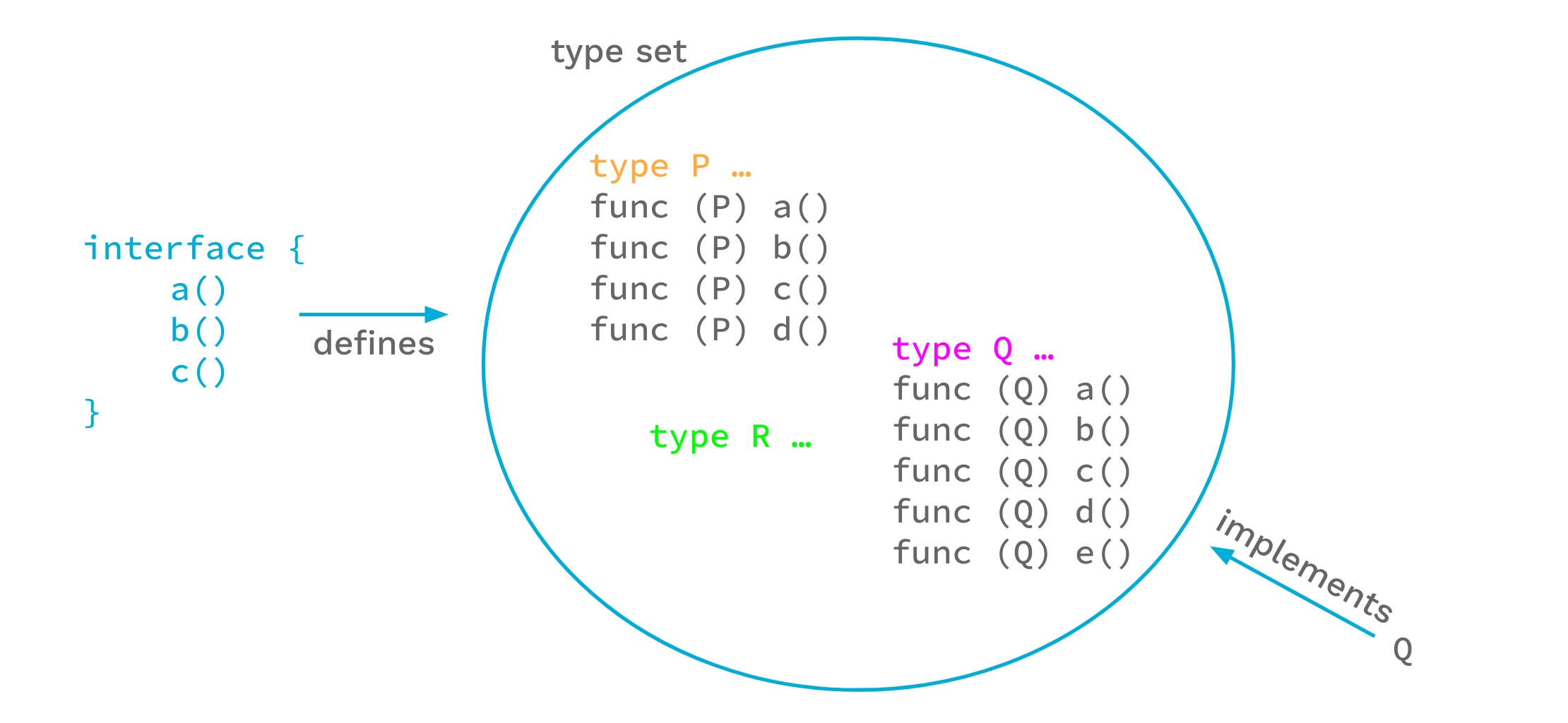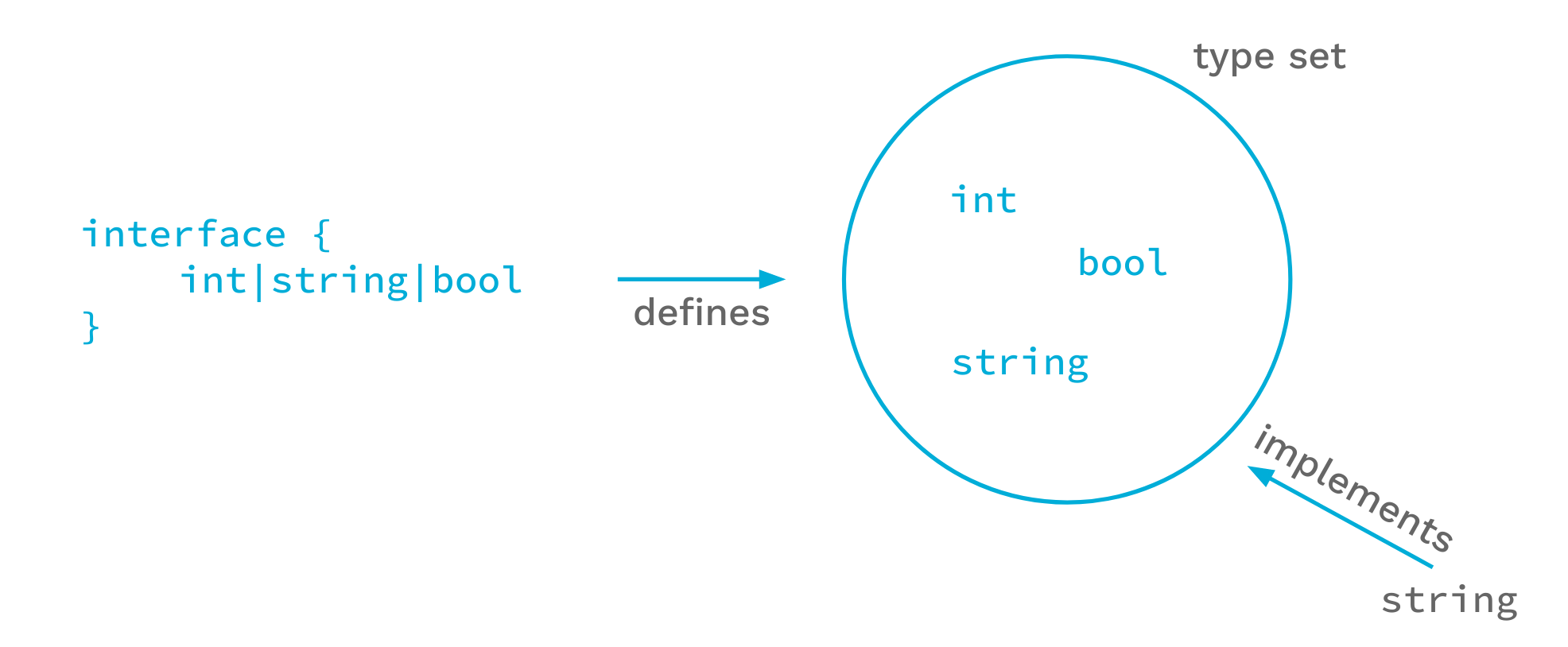18 KiB
| marp | theme | size |
|---|---|---|
| true | uncover | 4:3 |
Introduzione alle Generics in Go
Chi sono?
Antonio De Lucreziis, studente di Matematica e macchinista del PHC
Cos'è il PHC?
Il PHC è un gruppo di studenti di Matematica con interessi per, open source, Linux, self-hosting e soprattutto smanettare sia con hardware e software (veniteci pure a trovare!)


The Go 1.18 release adds support for generics. Generics are the biggest change we’ve made to Go since the first open source release
🔗 https://go.dev/blog/intro-generics
Il Problema
func Min(x, y int) int {
if x < y {
return x
}
return y
}
func MinInt8(x, y int8) int8 {
if x < y {
return x
}
return y
}
func MinInt16(x, y int16) int16 {
if x < y {
return x
}
return y
}
func MinFloat32(x, y float32) float32 {
if x < y {
return x
}
return y
}
...
if x < y {
return x
}
return y
...
Soluzioni Pre-Generics
-
Fare una funzione che prende
anyed usare degli switch sul tipo -
Copia incollare tante volte la funzione per ogni tipo
-
Utilizzare tool come
go generate
Soluzione Post-Generics
Type Parameters
import "golang.org/x/exp/constraints"
func Min[T constraints.Ordered](x, y T) T {
if x < y {
return x
}
return y
}
var a, b int = 0, 1
Min[int](a, b)
...
var a, b float32 = 3.14, 2.71
Min[float32](a, b)
Type Inference
var a, b int = 0, 1
Min(a, b)
...
var a, b float32 = 3.14, 2.71
Min(a, b)
[T Vincolo1, R interface{ Method(), ... }, ...]
Type Sets

⚓ https://go.dev/blog/intro-generics
Type Sets

🐟 https://go.dev/blog/intro-generics
Type Sets

🐟 https://go.dev/blog/intro-generics
Type Sets (Sintassi)
-
[T interface{}]si può anche scrivere[T any] -
[T interface{ int | float32 }]si può anche scrivere[T int | float32]
Type Sets
func Somma[T float32|float64](x, y T) T {
return x + y
}
type Liter float64
var a, b int = 1, 2
Somma(a, b) // Ok
var a, b Liter = 1, 2
Somma(a, b) // Errore
Type Sets
func Somma[T ~float32|~float64](x, y T) T {
return x + y
}
type Liter float64
var a, b int = 1, 2
Somma(a, b) // Ok
var a, b Liter = 1, 2
Somma(a, b) // Ok
Type Sets
package constraints
...
type Float interface {
~float32 | ~float64
}
...
Type Sets
package constraints
...
type Ordered interface {
Integer | Float | ~string
}
type Float interface {
~float32 | ~float64
}
type Integer interface {
Signed | Unsigned
}
type Signed interface {
~int | ~int8 | ~int16 | ~int32 | ~int64
}
type Unsigned interface {
~uint | ~uint8 | ~uint16 | ~uint32 | ~uint64 | ~uintptr
}
...
Tipi Generici
type Stack[T any] []T
func (s *Stack[T]) Push(value T) {
*s = append(*s, value)
}
func (s Stack[T]) Peek() T {
return s[len(s)-1]
}
func (s Stack[T]) Len() int {
return len(s)
}
func (s *Stack[T]) Pop() (T, bool) {
items := *s
if len(items) == 0 {
var zero T
return zero, false
}
newStack, poppedValue := items[:len(items)-1], items[len(items)-1]
*s = newStack
return poppedValue, true
}
Per ora ci tocca utilizzare questa funzione di utility
func Zero[T any]() T {
var zero T
return zero
}
🔗 43651-type-parameters.md#the-zero-value
Pattern: Tipi Contenitore
Tipi generici nativi
-
[n]TArray di
nelementi per il tipoT -
[]TSlice per il tipo
T -
map[K]VMappe con chiavi
Ke valoriV -
chan TCanali per elementi di tipo
T
golang.org/x/exp/slices
func Index[E comparable](s []E, v E) intfunc Equal[E comparable](s1, s2 []E) boolfunc Sort[E constraints.Ordered](x []E)func SortFunc[E any](x []E, less func(a, b E) bool)- e molte altre...
golang.org/x/exp/maps
func Keys[M ~map[K]V, K comparable, V any](m M) []Kfunc Values[M ~map[K]V, K comparable, V any](m M) []V- e molte altre...
Strutture Dati Generiche
Esempio notevole: https://github.com/zyedidia/generic (1K⭐ su GitHub)
mapset.Set[T comparable], set basato su un dizionario.multimap.MultiMap[K, V], dizionario con anche più di un valore per chiave.stack.Stack[T], slice ma con un'interfaccia più simpatica rispetto al modo idiomatico del Go.cache.Cache[K comparable, V any], dizionario basato sumap[K]Vcon una taglia massima e rimuove gli elementi usando la strategia LRU.bimap.Bimap[K, V comparable], dizionario bi-direzionale.hashmap.Map[K, V any], implementazione alternativa dimap[K]Vcon supporto per copy-on-write.- e molte altre...
Anti-Pattern (1)
Utility HTTP
// library code
type Validator interface {
Validate() error
}
func DecodeAndValidateJSON[T Validator](r *http.Request) (T, error) {
var value T
if err := json.NewDecoder(r.Body).Decode(&value); err != nil {
var zero T
return zero, err
}
if err := value.Validate(); err != nil {
var zero T
return zero, err
}
return value, nil
}
// client code
type FooRequest struct {
A int `json:"a"`
B string `json:"b"`
}
func (foo FooRequest) Validate() error {
if foo.A < 0 {
return fmt.Errorf(`parameter "a" cannot be lesser than zero`)
}
if !strings.HasPrefix(foo.B, "baz-") {
return fmt.Errorf(`parameter "b" has wrong prefix`)
}
return nil
}
foo, err := DecodeAndValidateJSON[FooRequest](r)
if err != nil {
http.Error(w, err.Error(), http.StatusInternalServerError)
return
}
func DecodeAndValidateJSON(r *http.Request, target Validator) error {
err := json.NewDecoder(r.Body).Decode(target)
if err != nil {
return err
}
if err := target.Validate(); err != nil {
return err
}
return nil
}
var foo FooRequest
if err := DecodeAndValidateJSON(r, &foo); err != nil {
http.Error(w, err.Error(), http.StatusInternalServerError)
return
}
Anti-Pattern (2)
Generics vs Interfacce
Momento Quiz
func WriteOneByte(w io.Writer, data byte) {
w.Write([]byte{data})
}
...
d := &bytes.Buffer{}
WriteOneByte(d, 42)
func WriteOneByte[T io.Writer](w T, data byte) {
w.Write([]byte{data})
}
...
d := &bytes.Buffer{}
WriteOneByte[*bytes.Buffer](d, 42)
BenchmarkInterface
BenchmarkInterface-4 135735110 9.017 ns/op
BenchmarkGeneric
BenchmarkGeneric-4 50947912 22.26 ns/op
//go:noinline
func WriteOneByte(w io.Writer, data byte) {
w.Write([]byte{data})
}
...
d := &bytes.Buffer{}
WriteOneByte(d, 42)
BenchmarkInterface
BenchmarkInterface-4 135735110 9.017 ns/op
BenchmarkInterfaceNoInline
BenchmarkInterfaceNoInline-4 46183813 23.64 ns/op
BenchmarkGeneric
BenchmarkGeneric-4 50947912 22.26 ns/op
d := &bytes.Buffer{} /* (*bytes.Buffer) */
WriteOneByte(d /* (io.Writer) */, 42)
d := &bytes.Buffer{} /* (*bytes.Buffer) */
(io.Writer).Write(d /* (io.Writer) */, []byte{ 42 })
d := &bytes.Buffer{} /* (*bytes.Buffer) */
(*bytes.Buffer).Write(d /* (*bytes.Buffer) */, []byte{ 42 })
Go 1.18 Implementation of Generics via Dictionaries and Gcshape Stenciling
-
A gcshape (or gcshape grouping) is a collection of types that all share the same instantiation of a generic function/method.
-
Two concrete types are in the same gcshape grouping if and only if they have the same underlying type or they are both pointer types.
-
To avoid creating a different function instantiation for each generic call with distinct type arguments (which would be pure stenciling), we pass a dictionary along with every call.
🔗 generics-implementation-dictionaries-go1.18.md
Quindi nella maggior parte dei casi se ci ritroviamo a scrivere una funzione generica con un parametro vincolato ad un'interfaccia forse dobbiamo porci qualche domanda
Pattern: Type-safe Database
Vediamo un analogo di PhantomData<T> dal Rust per rendere type-safe l'interfaccia di una libreria
Proviamo ad usare questa tecnica per rendere type-safe l'interfaccia con *sql.DB
type DatabaseRef[T any] string
package tables
// tables metadata
var Users = database.Table[User]{ ... }
var Products = database.Table[Product]{ ... }
userRef1 := DatabaseRef[User]("j.smith@example.org")
...
// Ok
user1, err := database.Read(dbConn, tables.Users, userRef1)
// Errore
user2, err := database.Read(dbConn, tables.Products, userRef1)
package database
type WithPK interface {
PrimaryKey() *string
}
type Ref[T WithPK] string
type Table[T WithPK] struct {
Name string
PkColumn string
Columns func(*T) []any
}
...
func Read[T WithPK](d DB, t Table[T], ref Ref[T]) (*T, error)
package database
func Create[T WithPK](d DB, t Table[T], row T) (Ref[T], error)
func Insert[T WithPK](d DB, t Table[T], row T) (Ref[T], error)
func Read[T WithPK](d DB, t Table[T], ref Ref[T]) (*T, error)
func Update[T WithPK](d DB, t Table[T], row T) error
func Delete[T WithPK](d DB, t Table[T], id Ref[T]) error
func Read[T WithPK](d DB, t Table[T], ref Ref[T]) (*T, error) {
result := d.QueryRow(
fmt.Sprintf(
`SELECT * FROM %s WHERE %s = ?`,
t.Name, t.PkColumn,
),
string(ref),
)
var value T
if err := result.Scan(t.Columns(&value)...); err != nil {
return nil, err
}
return &value, nil
}
package model
type User struct {
Username string
FullName string
Age int
}
func (u *User) PrimaryKey() *string {
return &u.Username
}
package tables
var Users = Table[User]{
Name: "users",
PkColumn: "username",
Columns: func(u *User) []any {
return []any{ &u.Username, &u.FullName, &u.Age }
}
}
Quindi possiamo anche utilizzare le generics per rendere type-safe l'interfaccia di qualcosa che inizialmente non lo era.
Pattern: Channels
Alcune utility per lavorare meglio con i channel
func trySend[T any](c chan<- T, v T) bool {
select {
case c <- v:
return true
default:
return false
}
}
func raceSame[T any](cs ...<-chan T) T {
done := make(chan T)
defer close(done)
for _, c := range cs {
go func(c <-chan T) {
trySend(done, <-c)
}(c)
}
return <-done
}
type Awaiter interface {
Await()
}
type awaiterChan[T any] <-chan T
func (ac awaiterChan[T]) Await() { <-ac }
type targetChan[T any] struct {
c <-chan T
target *T
}
func (tc targetChan[T]) Await() { *tc.target = <-tc.c }
func race(rs ...Awaiter) {
done := make(chan struct{})
defer close(done)
for _, r := range rs {
go func(r Awaiter) {
r.Await()
trySend(done, struct{}{})
}(r)
}
<-done
}
var result2 int
var result3 float64
raceAny(
awaiterChan[string](c1),
targetChan[int]{c2, &result2},
targetChan[float64]{c3, &result3},
)
fmt.Println(result2, result3)
var result2 int
var result3 float64
// Variante più pulita di questa utility
channels.Race(
channels.Awaiter(c1),
channels.Awaiter(c2, channels.WithTarget(&result2)),
channels.Awaiter(c3, channels.WithTarget(&result3)),
)
fmt.Println(result2, result3)
1 + 1 = 2
Proof checking in Go
Premesse
Definiamo i possibili "tipi" delle nostre espressioni
type Bool interface{ isBool() }
type Nat interface{ isNat() }
type Nat2Nat interface{ isNat2Nat() }
Premesse
Trick per codificare higher-kinded types in Go
type V[ H Nat2Nat, T Nat ] Nat
Assiomi dei Naturali
type Zero Nat
type Succ Nat2Nat
// Alcuni alias utili
type One = V[Succ, Zero]
type Two = V[Succ, V[Succ, Zero]]
type Three = V[Succ, V[Succ, V[Succ, Zero]]]
Uguaglianza
type Eq[A, B any] Bool
// Eq_Refl ovvero l'assioma
// forall x : x = x
func Eq_Reflexive[T any]() Eq[T, T] {
panic("axiom: comptime only")
}
// Eq_Symmetric ovvero l'assioma
// forall a, b: a = b => b = a
func Eq_Symmetric[A, B any](_ Eq[A, B]) Eq[B, A] {
panic("axiom: comptime only")
}
// Eq_Transitive ovvero l'assioma
// forall a, b, c: a = b e b = c => a = c
func Eq_Transitive[A, B, C any](_ Eq[A, B], _ Eq[B, C]) Eq[A, C] {
panic("axiom: comptime only")
}
Uguaglianza e Sostituzione
Per ogni funzione F, ovvero tipo vincolato all'interfaccia Nat2Nat vorremmo dire che
F
Eq[ A , B ] ------> Eq[ F[A] , F[B] ]
Uguaglianza e Sostituzione
Data una funzione ed una dimostrazione che due cose sono uguali allora possiamo applicare la funzione ed ottenere altre cose uguali
// Function_Eq ovvero l'assioma
// forall f function, forall a, b nat: a = b => f(a) = f(b)
func Function_Eq[F Nat2Nat, A, B Nat](_ Eq[A, B]) Eq[V[F, A], V[F, B]] {
panic("axiom: comptime only")
}
Assiomi dell'addizione
type Plus[L, R Nat] Nat
// "n + 0 = n"
// Plus_Zero ovvero l'assioma
// forall n, m: n + succ(m) = succ(n + m)
func Plus_Zero[N Nat]() Eq[Plus[N, Zero], N] {
panic("axiom: comptime only")
}
// "n + (m + 1) = (n + m) + 1"
// Plus_Sum ovvero l'assioma
// forall n, m: n + succ(m) = succ(n + m)
func Plus_Sum[N, M Nat]() Eq[
Plus[N, V[Succ, M]],
V[Succ, Plus[N, M]],
] { panic("axiom: comptime only") }
1 + 1 = 2
func Theorem_OnePlusOneEqTwo() Eq[Plus[One, One], Two] {
// 1 + 0 = 1
// en1 :: Eq[ Plus[One, Zero], One ]
en1 := Plus_Zero[One]()
// (1 + 0) + 1 = 2
// en2 :: Eq[ V[Succ, Plus[One, Zero]], Two ]
en2 := Function_Eq[Succ](en1)
// 1 + 1 = (1 + 0) + 1
// en3 :: Eq[ Plus[One, One], V[Succ, Plus[One, Zero]] ]
en3 := Plus_Sum[One, Zero]()
return Eq_Transitive(en3, en2)
}
Conclusione
Regole generali
Per scrivere codice generico in Go
-
Se l'implementazione dell'operazione che vogliamo supportare non dipende del tipo usato allora conviene usare dei type-parameter
-
Se invece dipende dal tipo usato allora è meglio usare delle interfacce
-
Se invece dipende sia dal tipo e deve anche funzionare per tipi che non supportano metodi (ad esempio per i tipi primitivi) allora conviene usare reflection
Fine :C
Domande